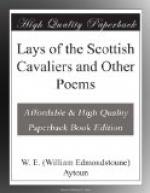“The aged King, already worn out by infirmity, and now broken by disappointment and sorrow, did not long survive the captivity of his son. It is said the melancholy news were brought him as he was sitting down to supper in his palace of Rothesay in Bute, and that the effect was such upon his affectionate but feeble spirit, that he drooped from that day forward, refused all sustenance, and died soon after of a broken heart.”
James was finally incarcerated in Windsor Castle, where he endured an imprisonment of nineteen years. Henry, though he had not hesitated to commit a heinous breach of faith, was not so cruel as to neglect the education of his captive. The young King was supplied with the best masters; and gradually became an adept in all the accomplishments of the age. He is a singular exception from the rule which maintains that monarchs are indifferent authors. As a poet, he is entitled to a very high rank indeed, being, I think, in point of sweetness and melody of verse, not much inferior to Chaucer. From the window of his chamber in the Tower, he had often seen a young lady, of great beauty and grace, walking in the garden; and the admiration which at once possessed him soon ripened into love. This was Lady Jane Beaufort, daughter of the Earl of Somerset and niece of Henry IV., and who afterwards became his queen. How he loved and how he wooed her is told in his own beautiful poem of “The King’s Quhair,” of which the following are a few stanzas:—
“Now there was made, fast by the
towris wall,
A garden fair; and in the corners set
An arbour green, with wandis long and
small
Railed about, and so with trees set
Was all the place, and hawthorn hedges
knet,
That lyf was none walking there forbye,
That might within scarce any wight espy.
“So thick the boughis and the leavis
greene
Beshaded all the alleys that there were,
And mids of every arbour might be seen
The sharpe, greene, sweete juniper,
Growing so fair, with branches here and
there,
That, as it seemed to a lyf without,
The boughis spread the arbour all about.
“And on the smalle greene twistis
sat
The little sweet nightingale, and sung
So loud and clear the hymnis consecrat
Of lovis use, now soft, now loud among,
That all the gardens and the wallis rung
Right of their song.
“And therewith cast I down mine
eyes again,
Where as I saw, walking under the tower,
Full secretly, now comen here to plain,
The fairest or the freshest younge flower
That e’er I saw, methought, before
that hour:
For which sudden abate, anon astart
The blood of all my body to my heart.
“And though I stood abasit for a
lite,
No wonder was; for why? my wittis all
Were so o’ercome with pleasance
and delight—
Only through letting of my eyen fall—
That suddenly my heart became her thrall
For ever of free will, for of menace
There was no token in her sweete face.”




